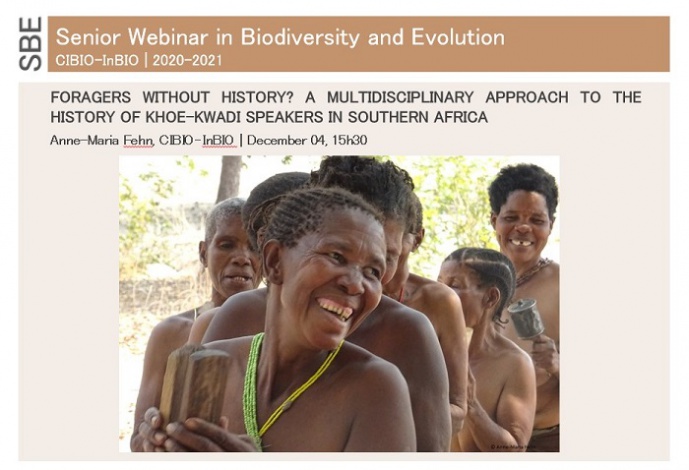Foragers without history? A multidisciplinary approach to the history of Khoe-Kwadi speakers in Southern Africa

SENIOR WEBINAR IN BIODIVERSITY AND EVOLUTION
The current diversity of southern Africa was mainly shaped by three population layers associated with distinct linguistic lineages: 1) hunter-gatherers speaking click-languages of the Kx’a and Tuu families; 2) Late Stone Age pastoralists associated with languages of the Khoe-Kwadi family; and 3) Bantu-speaking Iron Age farmers from West-Central Africa.
Focusing on ethnically diverse Khoe-Kwadi speakers from South Africa, Namibia, Botswana, Zimbabwe and Angola, we use newly collected as well as published data from human genetics and linguistics in order to test longstanding hypotheses about a pastoralist migration from eastern into southern Africa, leading to the diffusion of languages, cultural practices, and genetic material.
We find that Khoe-Kwadi populations are united by their linguistic ancestry, but have divergent genetic profiles similar to those of their Kx’a, Tuu, and Bantu-speaking neighbours. However, an eastern African contribution is present at varying amounts in all Khoe-Kwadi speaking populations, including in the formerly Kwadi-speaking Kwepe and other small-scale populations from the Angolan Namibe who otherwise share a genetic profile with Bantu speakers from the same area. A similar genetic component was found in modern pastoralists from eastern Africa, as well as in an ancient DNA sample from a herding site in Tanzania, suggesting its introduction to southern Africa by a migrant group.
Taken together, our results show an association between Khoe-Kwadi languages, pastoralism, and an eastern African genetic heritage. After their initial migration into southern Africa, the pastoralists started to diverge and interact with Kx’a and Tuu-speaking groups, as well as with incoming Bantu farmers from the eastern and western branches of the Bantu migrations. While the full package (pastoralism, eastern African ancestry, and Khoe-Kwadi linguistic patrimony) was primarily retained in the Khoekhoe herders of South Africa and Namibia, interaction in a contact zone led to the diverse combinations of culture, genes, and languages characteristic of modern Khoe-Kwadi speakers.
Anne-Maria Fehn is a linguist and member of the Human Evolutionary Genetics group at CIBIO-InBIO who specializes in historical relations and contact patterns between the four southern African language families, Kx'a, Tuu, Khoe-Kwadi, and Bantu. She currently focuses on the description of under-documented Kalahari Khoe varieties from the northern and eastern Kalahari Basin fringe, as well as on the historical link between Khoe and the extinct Angolan language Kwadi. Her work is explicitly multi-disciplinary and takes into account results and methodologies from human evolutionary genetics and bioinformatics.
[Host: Jorge Rocha, HUMANEVOL]